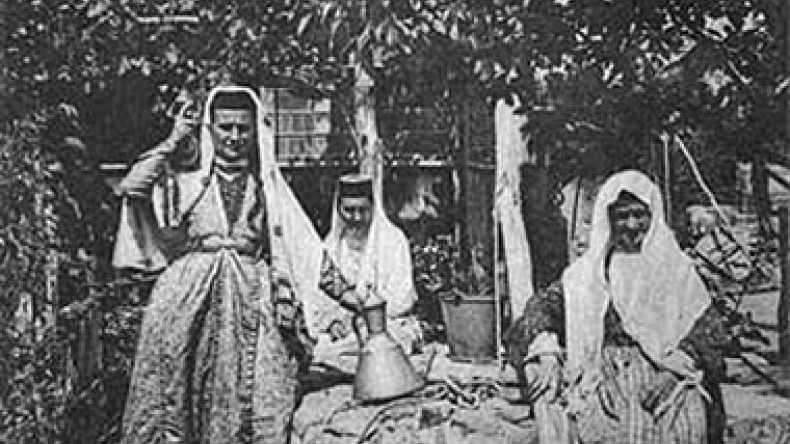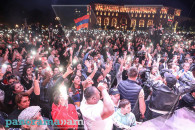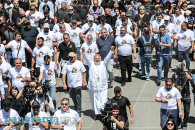
Scientific publication of Russian Empire: Tatar women were known for unbridled speech and indecent tricks
In the 20th issue for the year 1894 of the project “Collection of Materials to Describe the Terrain and Tribes in the Caucasus,” the teacher and supervisor of the Batumi vocational school, A. Zakharov, published an article, in which he recounts the process of the young Tatar girls’ education and upbringing.
According to the article, girls from both poor town neighborhoods and villages stayed outside most of the day learning many things in the environment surrounding them. Early in the morning, barefoot little girls went out in one shirt and short shalwars to collect the cow dung gathered in the town streets overnight in the wooden bowls on their heads; Tatar women pressed the dung to make fuel. “The plight of those unhappy children is really dreadful. They spend the whole day in the street surrounded by little boys like them and learn various cynical tricks and vulgar oaths from them. Those children get depraved very quickly,” the author writes. He recalls often witnessing six-or-seven-year-old children playing husband and wife with dirty scenes. When a six-or-seven-year-old boy makes such dirty proposals to girls of his age, his future becomes frightening, he stresses.
Forced to sell milk, fruit and churek in the streets since young ages, the girl met different “morally spoiled” boys, often witnessed indecent street scenes and heard all sorts of vulgar expressions. As a result, she started talking vulgarly, too, without being ashamed of anyone’s presence. Moreover, the author writes that they often became agents of gangs and night thieves: under the guise of selling fruit or milk, they entered the houses of well-to-do citizens and peeped around, got acquainted with the internal arrangement of the rooms, spied what things in which rooms were kept, and so on.
“Those girls’ future is not promising to be enviable. Mostly they get into brothels. The majority of the prostitutes are daughters of laborers or craftspeople,” the author notes.
At home, the environment in which a girl grew up was far from being idyllic. Mother did not choose expressions speaking to her; she beat and scolded her. Among the most common expressions were – “may you be roasted at low heat,” “may I see your curls in blood,” “may Allah send you scabies and take away your nails.” Women from lower town ranks scolded their little daughters with the most obscene words, like “you brothel girl,” “may I see you in a crowd of soldiers.” Among the strong profanities were “You, daughter of a Russian” or “of an Armenian,” “you a soldier’s bride.”
In the villages, as the field works started, mothers took their daughters to the field, garden, where they could help them. They also went to fetch water with their mothers. “The Tatars take their drinking water from a spring. The spring is a conciliar place for the women villagers. Standing in a line, they tell each other about the village news, explain dreams, dish the dirt about those absent, gossip or make up easy squabbles having nothing else to do,” Zakharov writes.
He highlights that the Tatar women did not care much about choosing words, and called the things by their names. Without being ashamed of the presence of their little daughters, they shared with each other the details of their intimate life “with a cynical openness.” The spring was a “school of morality” for the little Tatar girls. There they first got to know the life and the role the woman was supposed to play in life; in addition, they mastered the unbridled speech and the indecent tricks “Tatar women are so known” for. Meanwhile, they learnt prejudices and superstitions.
However, the wealthier urban Tatars preferred to send their daughters to school when they reached the age of 7 or 8 years. The schools were maintained by women-mullahs. Those women’s educational standards were limited in being able to read – most of them could not even write because the women were forbidden to write.
“A respectable mullah explained me the reason of that strange practice. He said the schools do not teach them that art so that they do not write letters to young men. Women-mullahs enjoy the Tatars’ respect and esteem. The mechanism of reading Tatar letters presents such difficulties that the person who successfully overcomes them cannot but arouse astonishment and respect,” the author writes. He notes that the whole essence of the education the girls received finally assumed serving the woman mullah carrying out her housework chores and endlessly learning the Quran by rote.
As soon as the pupils came to school, which served as a dwelling place for the teacher, she made them make the bed, sweep the room and do other housework. If she was going to cook something, one of the pupils had to chop the onion, the second cut the meat, the third carried the water, the fourth made the fire, and so on.
“The days the teacher bakes bread are especially terrible for the girls. Baking bread is a long procedure for the Tatars as they bake a supply for the whole week or more,” the author writes noting that the lessons began only after the domestic chores were done.
The educational process looked as follows: the teacher, armed with a long stick, sat leaning on a trunk behind her. The pupils kneed in front of her holding open books in front of them. They went up to the teacher in turn to recite the lesson. Totally ignorant of Quran’s language, Arabic, the girls had to learn surahs from it by heart and repeat them. Remarkably, the teacher followed that the girl, who did not know a single letter, looked at the book while reciting the lesson as if she were reading it. In case she left out or forgot even a word, she was punished. The author dedicates a separate description of the sophistication of those punishments.
Once he witnessed how a seven-year-old girl standing punished on the right leg while pressing the soles of the left foot to the right knee and holding the open Quran above her head. She was supposed to stand like that until the water in the jug, which the teacher had put on the mangal in front of her, boiled. Each time she attempted to change her position or let the hand or foot down, the teacher hit her with stick. The big teardrops flowing down the girl’s face did not arouse the mullah’s pity.
Another type of punishment was making the pupils knee for hours on peas or crushed brick scattered across the floor. Further, the author writes about a method the teachers in Tatar women’s schools practiced in case they had to go out of school. In order not to spoil the girls and make sure they did not play pranks, the teacher laid them separately on the floor, smoothly spread the ends of their dresses on the floor and scattered sand on them making certain signs on them. Even a slightest movement could distort the signs, and the poor girls had to sit still for hours without being able to move because of the fright of distorting the signs on the sand.
As soon as the girl reached the age of ten or eleven years, she was considered a bride and it was indecent for her to go out alone. “In general, the Tatar girls maturate very early. In ten or twelve, they are already women. I knew twelve-or-thirteen-year-old mothers,” the author writes.
Notably, the Tatar women had little interest in the housework: they knew that neither domesticity nor being a good housewife could capture a man’s heart, but the good looks. For a Tatar woman, the married life was a rough satisfaction of the man’s lust. “With rude and cynical openness, a Tatar mother would explain a woman’s future role in the family life to her daughter, and the young Tatar girl becomes convinced that the relations between a man and a woman are based on sexual intercourse,” Zakharov points out.
At home, the girl was taught to be obedient and take all the insults and oppressions with all humility. In some Tatar villages, there was a custom of young girls and women washing the guests’ feet. The master of the house met the guest and seated him in a respectable place. A little later, the master’s eldest daughter or young wife entered the room with a copper bowl of hot water. Her face was covered. Kneeing before the guest, she took off his footwear and started to wash the feet.
As for the young Tatar women’s looks, Zakharov writes that they were naturally quite beautiful, still they spoilt their beauty with the excessive use of ceruse, rouge and various homemade cosmetic products. The local etiquette demanded that the girl went out with her face whitened, rouged, eyelashes and brows darkened and fingers painted with henna.
To be continued.
The “Collection of Materials to Describe the Terrain and Tribes in the Caucasus” is a large-scale publication of narrative sources carried out by the management of the Caucasus Educational Okrug in 1881-1908. It includes researches and description of the history, life, and ethnographic characteristics of the peoples inhabiting the Caucasus region of the Russian Empire.
Newsfeed
Videos






























